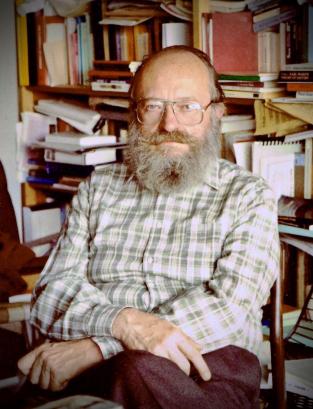The Centre Leo Apostel (CLEA) was founded in 1995 as a transdisciplinary research department, situated at the Vrije Universiteit Brussel (VUB). It is named after the Belgian philosopher and logician Leo Apostel (1925-1995). Apostel donated the money of the Solvay prize, which he received for his life work, to the VUB in order to create such a centre.
Leo Apostel
Leo Apostel (1925 – 1995) was a Belgian philosopher and professor at the Vrije Universiteit Brussel and Ghent University. Apostel was an advocate of interdisciplinary research and the bridging of the gap between exact science and humanities.
Philosophy
The strength of CLEA lies in its research philosophy, which we characterize as “thinking beyond boundaries”. This approach may be described as ‘transdisciplinary’ or 'a-disciplinary' rather than ‘interdisciplinary’, given that interdisciplines, such as molecular biology or economic geography, often just become new disciplines. Neither fundamental questions about the universe (such as the meaning of life, mind or complex organization), nor practical problems of contemporary society (such as sustainability or globalization), care about disciplinary boundaries. Reality is an interconnected whole that cannot be divided into separate domains.
In CLEA, researchers from very diverse backgrounds work closely together in addressing such basic challenges, without being restricted by traditional boundaries and subdivisions. For us, the significance of the research question is more important than the discipline in which this topic is supposed to be situated. This allows researchers to focus on radically novel, yet promising issues that fall outside the existing categories—such as quantum structures in decision-making, or the emerging intelligence of the Internet. However, this does not prevent them from acquiring highly specialized knowledge in the subject of their research where necessary. A-disciplinarity is not the same as shallow generalism, in which a researcher knows a little about a lot of topics but does not master anything in depth. This philosophy characterizes CLEA internationally as a research centre unique in terms of both methodology and research topics.
Management
The following team at present takes care of the day-to-day management:
- Prof. Dr. Francis Heylighen: scientific director
- Prof. Dr. Em. Diederik Aerts: founding director
- Dr. Marta Lenartowicz: director of education
- Nathalie Degraide: coordinator
In practice, CLEA is run mostly in a distributed, democratic, self-organizing manner, which relies on individual responsibility, mutual trust, and quick, informal communications. Indeed, it is thanks to CLEA's broad, international network that it can compete with much larger and more prestigious research institutes. The about 40 researchers working with CLEA are being kept informed and incited to participate in different initiatives via the CLEA-Practical mailing list.
Impact of CLEA research
CLEA has produced over 1800 peer-refereed, international publications, mostly in Web of Science listed journals, or as chapters in books and encyclopedias. These extend across about all the classic disciplines in the sciences, social sciences and humanities, from physics to psychology, from biology to economics, and from philosophy to computer science. These publications are often highly cited, with at least ten CLEA members and former members having over 1000 citations each. Further evidence for the high quality of our research is that CLEA alumni have obtained tenured positions as professors across the world, including in such prestigious institutes as Oxford University, University of British Columbia, Indiana University, the French CNRS, University of Amsterdam, and the Universidad Nacional Autónoma de México.
CLEA presently publishes two transdisciplinary journals that are both indexed by Thomson Reuters (Web of Science), respectively in the Science Citation Index and Arts & Humanities Citation Index:
- Foundations of Scienc, (edited by D. Aerts) and
- Constructivist Foundations (edited by A. Riegler).
CLEA also from time to time organizes international conferences. The largest one was the university-wide conference Einstein meets Magritte, which CLEA organized in 1995 for the 25th anniversary of the Vrije Universiteit Brussel. During that conference, famous scientists, philosophers, writers and artists entered into an interdisciplinary reflection on science, nature, human action and society. The Proceedings of that conference were published as a series of eight books. For more recent examples, CLEA organized the conference “Times of Entanglement” as part of the Shanghai World Expo of 2010 to reflect on creativity, intuition and entangling conceptions of reality, and “Worlds of Entanglement” at the VUB in 2017.
Since 2002, CLEA also organizes a series of open, interdisciplinary seminars featuring research by CLEA members and visiting scientists, producing about twenty two-hour seminars per year. Since 2013, most of these presentations and the ensuing discussions have been recorded on video and published via our YouTube channel. These videos typically gather over a hundred views per seminar, up to several thousands for the most popular ones.


Social Media Links